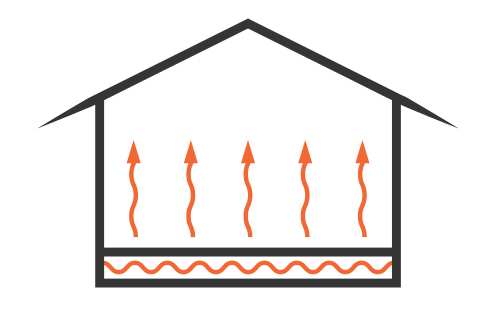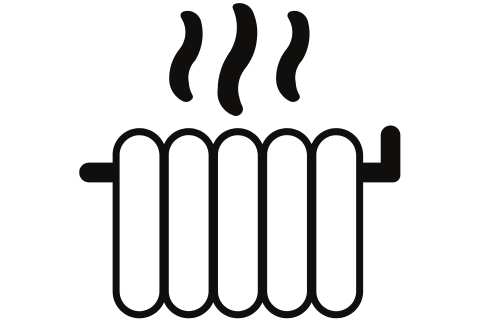How much does underfloor heating cost?
Does a nice toasty warm floor when you wake up in the depths of winter sound like a luxury? Well, you could have that melting feeling every morning with underfloor heating.
Get new boiler quotes online >
If you here then obviously you are interested in how much underfloor heating costs and in this guide, we will give you the prices per square metre, per room with and without labour costs.
What is the cost of underfloor heating?
Underfloor heating can be a more efficient, eco-friendly, and cost-effective alternative to radiators for heating your home, but how much will underfloor heating cost? And how can you save money on heating bills?
If you’re buying a new boiler to keep energy bills down, why not take a look at wet underfloor heating systems that can be used with a new A-rated boiler! New boiler costs can be around £2,000 so they aren’t cheap, but you could be saving up to £580 per year on your energy bills by upgrading from an inefficient boiler.
Underfloor heating cost – How much is labour?

A typical underfloor heating installation costs between £200 and £300 per day in labour. This applies regardless of whether you choose to install an electric or a wet underfloor heating system.
Warm water underfloor heating is available for as low as £810 in a 20m2 area. Prices will vary depending on the project. This type of central heating option is affordable and around 25% more efficient than radiators. You can save on heating costs by using it.
It can be time-consuming and complex to install underfloor heating systems. This makes labour costs more expensive. If you are installing underfloor heating in an older building, it will be necessary to remove the flooring and have it re-fitted after the installation is completed. This step is the most difficult, especially in older homes with larger rooms.
It takes approximately 1-5 days to install underfloor heating for both dry and wet systems.
How much does underfloor heating cost per square metre?
The cost of underfloor heating per square meter will depend on which solution is chosen and a standard screed UFH system is usually cheaper for a new-build project than a retrofit solution that requires more materials.
Wet underfloor heating system costs:
New install: From £120 to £135 per square meter
Renovation property: from £135 to £185 per square m2.
Cost of electric underfloor heating
New install: From £55 to £80 per square metre
Renovation property: from £60 to £85 per square metre
Estimated prices for electric and water heating.
The average price to install electric underfloor heating systems is £800 (10m2).
The average cost to install wet underfloor heating systems is £1,200 (10m2).
Looking for a new boiler? check out the best combi boilers here in our guide
New build underfloor heating cost
The cost of underfloor heating can be quite high considering the associated costs. However, some electric underfloor systems are an affordable option for new builds.
The average price per square meter for an electric system could be as low as £35 and the installation can take up to two hours. High electricity bills will be caused by electric underfloor heating installed throughout the building.
Screed Underfloor Heating like ClipTrack is an economical heating option for new properties that can be easily integrated into a build schedule. The installation is fast, which reduces labour costs.
A typical self-build project, such as a 3 bedroom detached home with a 100m2 floor area, would cost approximately £5000 or £50m2. A typical self-build project (e.g. The system would be custom-designed to your property and include the best quality components as well as unrivalled customer service throughout its lifetime.
To ensure that the system works as it should, every project should be managed by experienced underfloor heating specialists.
Renovation electric underfloor heating costs
Underfloor heating is an excellent choice for home renovations. For electric underfloor heating single rooms and bathrooms work well, especially when it is a small project.
If you are unable to find the right size, it is recommended that you purchase the smaller size. You can also add an additional mat that protects against cracks when unheated. This will prevent overheating.
Retrofit warm water UFH systems can supply more materials (e.g. Pre-routed panels and specialist self-leveling compounds are more expensive than new systems.
UFH is now possible for most homes. This includes all the necessary equipment to complete the installation before floor covers can be laid. There is no additional cost for the screed.
Did you know some home could be powered by an electric boiler? See the latest electric combi boiler costs in our guide if you don’t have gas or a re considering alternatives.
Installing underfloor heating: What is the cost?
Once you know the price of the system, it is time to calculate the cost of having it installed by a licensed heating and plumbing engineer.
It is hard to estimate the cost of installing underfloor heating as the price will vary depending on where you live and what type of underfloor heating system you have. The installation cost would typically be between 40-50% of the overall system price.
It is possible to fix the fixing system and tube your own or hire a professional to do it. The plumber will then set up the manifold and connect it to the boiler to re-commission the system.

Underfloor Heating Cost By Room
As we know, larger rooms are more expensive to install underfloor systems. The following guide will give you an idea of the underfloor heating installation cost for specific rooms.
Small bathroom underfloor heating
A small bathroom can be made more spacious by installing an underfloor system. It will allow you to free up space that would otherwise have been occupied with a radiator.
Cost estimate for a small bathroom of 6m2:
Electric underfloor heating: From £320 to £480
Wet underfloor heating: From £490 to £890
Labour costs: £200 – £250 per day
Bathrooms of medium size
Underfloor systems are a great way to increase the space in a medium-sized bathroom. This could be an energy-efficient way to keep the space warm.
Cost estimate for a medium 11m2 bathroom:
Electric underfloor heating: From £560 to £830
Wet underfloor heating: From £850 to£S1,600
Labour costs: £250 – £300 per day
Medium-sized kitchen underfloor heating
In medium-sized kitchens, wall space is often taken up by appliances and there is little room for radiators. Underfloor heating systems are a great choice for kitchens.
Cost estimate for a medium 11m2 kitchen:
Electric underfloor heating: From £560 to £820
Wet underfloor heating: From £850 to £1,600
Labour costs: £200 – £250 per day
Large kitchen Underfloor Heating
Heating a larger kitchen is more difficult. An underfloor system can maintain the ideal temperature for both your kitchen area and dining room.
Cost estimate for a large 21m2 kitchen:
Electric underfloor heating: From £1,080 to £1,590
Wet underfloor heating: £1,700-£3,200
Labour costs: £250 – £300 per day
Can you Install Underfloor Heating yourself?
You can save money by doing the installation yourself. It can be challenging to install an underfloor system. This is particularly true in larger rooms, where it can be difficult to arrange the pipes and mats correctly to ensure even heat distribution. Professionals are recommended to ensure that the underfloor heating is properly laid out.
An electrician will be needed to verify that the dry system is properly wired and a plumber to connect the wet system to a boiler. It will be easier to avoid electrical faults and leaks that are common with poorly installed underfloor systems.
You can easily install an electric underfloor heating system in a small room with the help of a professional.
You will need additional materials such as screed and insulation boards to complete the groundwork.
What are the best underfloor heating systems for a UK house?
There are two types available for underfloor heating: electric and water and the best option for you will depend on your budget and your property’s age.
They both have their pro’s and cons and are more energy efficient depening on how and when you are intending on turning up the heating system. Let’s take a look at running costs of both systems so you can understand which system is best for your home.
Underfloor heating running costs
We get asked this question a lot: “Is underfloor heating costly to operate?” Below are some details on UFH operating costs and a table comparing electric underfloor heating with warm water UFH.
Heating with warm water underfloor heating costs
Warm water underfloor heating can be a very efficient heating system. It is around 25% more efficient that radiators when it is paired with a modern boiler, and up to 40% more efficient when run from a Heat Pump (including Air Source Heat Pump or Ground Source Heat Pump).
This means that running costs can be as low as a traditional radiator system, and about a third less than an equivalent electric UFH unit.
Running costs for electric underfloor heating
The running costs of a warm-water underfloor heating system or a wet radiator system that is paired up with a gas boiler can be three to fourfold higher than an electric underfloor heating . Electric tends to be more expensive than natural gas per unit of heat.
The electric UFH is an excellent choice for small spaces such as bathrooms and kitchen refurbs. It can heat hard floors. Because of its running costs, it is not often used to heat entire properties.
There are pros and cons to underfloor heating before you decide to install it. Below are some of the advantages and disadvantages of underfloor heat. Although the initial cost and installation time may be expensive, you should consider it an investment in your home for the long-term.
Looking for an electric alternative? See the best electric combi boilers in our review to see if they are a better option than underfloor heating?
Is underfloor heating more expensive to run than radiators?

Electricity is more costly than gas so electric floor heating won’t be cheaper than a gas radiator.
After the initial cost of material and installation, the wet underfloor heating system is very affordable over time. It distributes heat more efficiently and allows for better temperature control.
Additionally, UK homeowners who use a sustainable source of heat can be eligible for a financial incentive program.
Renewable Heat Incentive
The UK Government has created the Renewable Heat Incentive ( RHI), which encourages homeowners to use Renewable Energy. It supports biomass boilers, ground-to-water and air-to water heat pumps.
The regulating body of the RHI, Ofgem, has more information about how to apply, how calculations were made, and the most recent scheme change.
Do I need to keep the underfloor heating on all the time?
It is best to keep it on during winter. Heating underfloors takes longer to heat up, so turning it off can lead to wasted energy. The best heat efficiency control and heat distribution will be achieved by installing thermostats in different rooms. Modern thermostats have a setback temperature which automatically lowers the temperature at night. This saves you money on your monthly bills.
Why should you consider underfloor heating?
There are many benefits to underfloor heating. You will be able to walk comfortably barefoot throughout the year and your home will feel warmer. Heating your home evenly with underfloor heating is a great way to distribute heat. This is something that not all wall radiators are capable of. The best underfloor heating system of the right size can heat larger areas more efficiently than a traditional radiator.
You will also save money by heating a room with an underfloor heat system that uses lower heat. Underfloor heating also allows you to remove wall radiators.
They wouldn’t be needed anymore. You can make your home larger by removing radiators. You can also install underfloor heating below stone, tile, or wood, so it will suit any room of your home. It is a high-quality product that can help increase your property’s value.